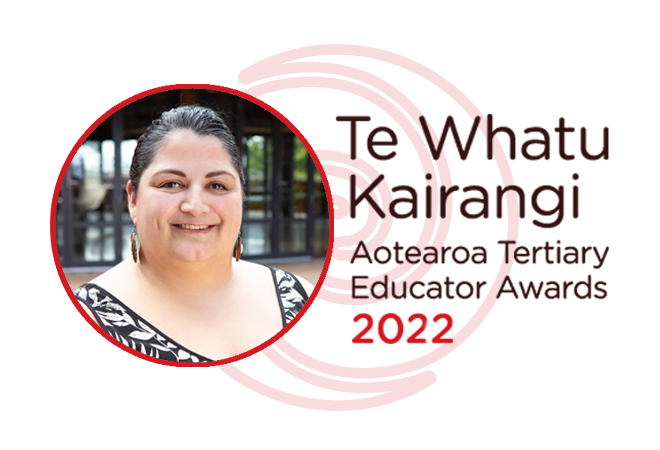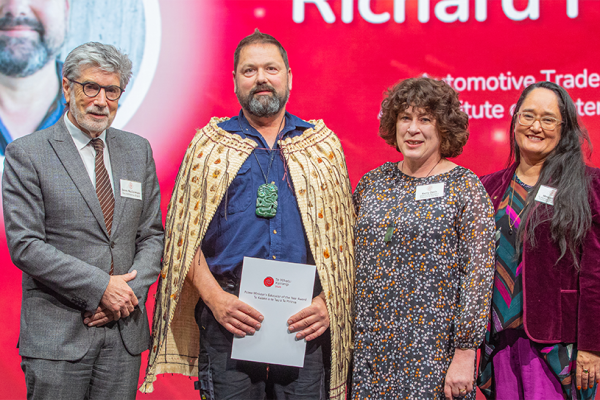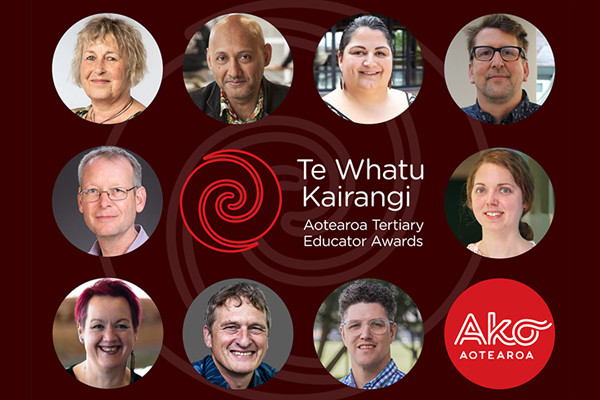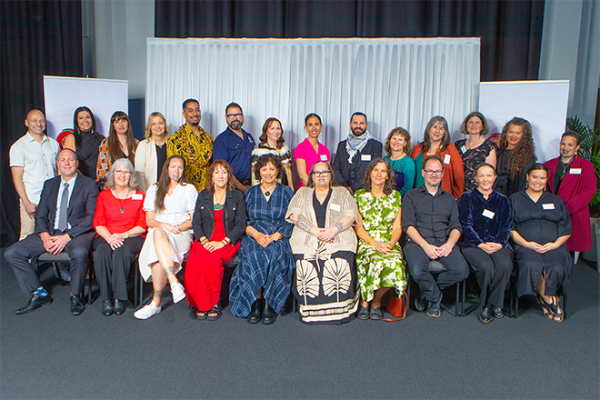Dr Marcia Leenen-Young
Pacific values guide this ‘special kind of teacher'
Category winner | Achieving diversity and inclusion for improving outcomes for: Māori learners; Pacific learners; neurodiverse learners; and/or learners with disabilities
Senior Lecturer in Pacific Studies, Waipapa Taumata Rau | The University of Auckland
Watch Dr Marcia Leenen-Youngr's Teaching profile video
“My impact as a Pacific educator is significant on Pacific learners because I develop strong connections with my students and focus on working with them to achieve excellence as Pacific peoples.”
Marcia is Senior Lecturer and Pacific historian in Pacific Studies, Te Wānanga o Waipapa | School of Māori Studies and Pacific Studies at Waipapa Taumata Rau | University of Auckland. She is Samoan/Pālagi, born in New Zealand to an immigrant mother from Samoa and a first-generation Dutch New Zealander. Marcia’s mother, Teresa Young, although having left school at age 15 because the Western system of education had failed her. saw education as the only way to succeed. She guided Marcia on her path to being an educator; one who was passionate about supporting Pacific students to achieve excellence. Marcia’s goal at the University of Auckland is to build a pipeline of Pacific history at all levels so the number of historians with ancestral ties to the Pacific increases in Aotearoa. This will impact the learner, the education sector, the teaching of history in Aotearoa, and also Pacific communities as an act of reclaiming their historical narratives.
Marcia’s teaching philosophy is holistic. It reflects her family background, values, and her experiences as a teacher and learner, it is informed by her own research and reflection, and it is shaped by the work of Pacific scholars. She recognises and respects her students as people who bring many experiences and influences into the teaching space. She works to decolonise educational spaces in the university and create spaces where the Pacific values of community, service, and respect are centred and where Indigenous Pacific knowledges and the voices of Pacific peoples are not only emphasised, but prioritised. She consistently reflects on and develops her pedagogical practices to better connect to her students to create an uplifting learning experience, not only for Pacific students but for all students.
“I encourage students to connect with history, emotionally react to it, and build historical analyses that are critical and speak to their own personal worldviews.”
Although she welcomes all into her teaching environment, which includes Pacific history and Pacific Studies at all levels, Marcia centres Pacific ways of knowing, practises Pacific pedagogies, and focuses on supporting the success of Pacific students. She believes that, although Pacific students have been a priority group in education in Aotearoa for the past twenty years (as in the 2001 Pasifika Education Plan, the 2020 Statement of National Education and Learning Priorities and the Tertiary Education Strategy), universities continue to alienate, isolate, and demotivate Pacific students. Her drive as an educator is to shift this experience of university for as many Pacific students as possible.
During her career at the University of Auckland, spanning almost two decades, Marcia has striven for learner success as a student mentor, a pastoral student support advisor, a learning advisor and designer, and as a teacher. Having struggled with isolation herself as a Pacific postgraduate student in Ancient History, she lobbied the Classics and Ancient History Department in 2002 to establish a position of Māori and Pacific mentor to support undergraduate students, which then merged with the Tuākana programme in the Faculty of Arts. In 2016 she was offered a Professional Teaching Fellow (PTF) position in the Certificate of Health Sciences, where she added her pedagogical expertise to a practical course that exposed students to key components of Māori and Pacific culture. In 2017, she was offered a PTF position as the Communications and Capability Specialist in Teaching and Learning at the Business School where she contributed to the development of online academic programmes, such as the proposed Masters of Māori and Indigenous Business Programme, supported the development of the online Learning Hub, and led academic initiatives with the Tuākana programme. In 2018, because of her expertise in curriculum design and Pacific learners, she was invited to join Pacific Studies as a PTF. She became a lecturer in 2019, achieving senior lecturership in 2021, and continues to create, teach, and redesign courses at all levels.
Marcia’s teaching approach involves centring Pacific knowledges in a way that is student-focused and communal, innovative, creative, empathetic, relational, and mana-enhancing. Centring Pacific knowledges allows her learners to see themselves, their ancestors, and their cultural knowledge as valid within the framework of a Western education. Student-centred learning pedagogies align with Pacific learning approaches as they view the teacher and the learner in a two-way relationship. Marcia fosters collaboration in large lectures through online tools such as Mentimeter or Padlet, and creating a cohort feel within the class through open discussion. She builds space in the curriculum for collaborative knowledge-building, such as in PACIFIC 304 where students co-design the curriculum in the final weeks of the semester. She also creates learning opportunities outside the lecture theatre to enhance student experience, such as in workshop-based lectures where the class take a virtual tour of colonial monuments on campus, visit the Auckland War Memorial Museum to search for stories of Pacific peoples in WWII, and analyse Indigenous Pacific primary sources in the Fale Pasifika. She encourages students to think about knowledge presentation beyond the written word and challenges them to submit assessments in oral, written, visual, and digital mediums.
A key component of Marcia’s pedagogical approach is working to uplift and strengthen the mana of her students by practising empathy and developing connections. At the beginning of new courses she shares who she is as a Pacific person by introducing her family and her ancestral connections to the Pacific. By making a clear positionality statement, she connects to students and helps them understand that who she is impacts her pedagogy and perspective. Practising empathy is also an important part of who Marcia is as a teacher. Her interactions with students focus on wellbeing, offering support, and enhancing mana.
Marcia has carried out research and published on Pacific students and has been invited to present at conferences on pedagogy and Pacific students within a university setting. Her publication on how Pacific students learn argues for shifting focus from a Western pedagogical framework in universities to one that better reflects the current context of Aotearoa (Leenen-Young, 2020). She is creating a pipeline from first year to postgraduation where students can study Pacific history with a Pacific person in a way that centres Pacific values. This will directly inform how Pacific history is taught in Aotearoa with the restructure of the NCEA history curriculum and the inclusion of Pacific Studies as a new NCEA subject. In 2021, she received the Faculty of Arts Leadership in Teaching and Learning Award and a University of Auckland Early Career Excellence in Teaching Award.
“The impact of showing Pacific learners that you believe in their potential is beyond measure with benefits that resonate to family and community.”



